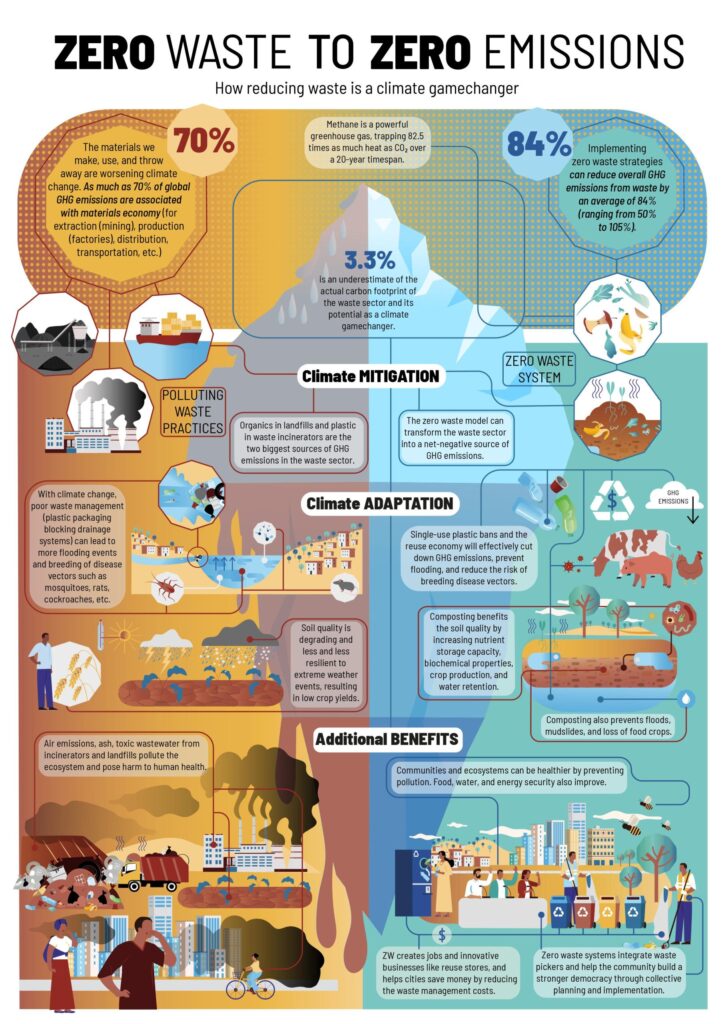The climate crisis is intensifying. Responding to a rapidly changing climate and eliminating greenhouse gas (GHG) emissions are both crucial steps to avoid a climate disaster. By focusing on the most practical sectors, local governments and cities can create significant change in the near and medium term.
In particular, the waste sector offers cities the opportunity to reduce emissions, strengthen resilience, and provide considerable economic and health benefits. By applying good waste management practices, it is possible to reduce emissions in other sectors as well.
That’s where Mission Zero Academy’s Carbon Calculator comes in. The first step for any city looking to achieve zero waste and drastically reduce their GHG emissions is to analyse your current emissions and compare them with future scenarios. Find out more below.
Positive impacts of adopting zero waste strategies
The material economy produces 70% of global greenhouse emissions, which includes source extraction, manufacturing, and disposal. The waste sector is the third-largest source of human-caused methane emissions. By reducing waste generation and implementing better waste management strategies, emissions can be reduced throughout a product’s lifecycle.
The concept of zero waste refers to strategies that aim to reduce waste through source reductions, separate collection, composting, and recycling. It should be part of any climate plan. In their new report ‘Zero waste to zero emissions’, Global Alliance for Incinerator Alternatives (GAIA) outlines the overarching positive impacts of adopting zero waste strategies as a local government Here are some of them.
1. Climate mitigation
There are three ways in which zero waste systems contribute to reducing greenhouse gas emissions:
- Source reduction, separate collection, and treatment of organic waste avoids landfill methane emissions.
- Turning organic waste into composting enhances the absorption of carbon by the soil.
- Source reduction, for example restricting single-use packaging, and recycling of municipal waste streams reduces “upstream” emissions from natural resource extraction, manufacturing, and transport.
According to a joint analysis by the UN Environment Programme and the International Solid Waste Association, the waste sector is capable of reducing global GHG emissions by 20%.
2. Climate adaption
As extreme weather events and health hazards impact cities more frequently due to climate change, zero waste systems help cities build resilience. The poor collection and management of waste leave cities especially vulnerable to these events. A zero waste system mitigates floods, reduces disease transmission, and improves soil quality.
3. Additional benefits
There is a significant underestimation of the potential of the waste management sector. Also called ‘co-benefits’, well-developed zero waste strategies help cities in more ways than the above.
Good waste management can have a positive impact on basic societal functions. Examples: improving public health, reducing pollution, job creation, community development, and addressing inequality. In addition, these systems are easy to implement and produce fast results.

Examine your city’s waste management with the Carbon Calculator
Over 550 municipalities around the world are already implementing zero waste programs. While zero waste principles are universal, the implementation will depend largely on local factors. It is therefore critical to obtain, analyse, and translate accurate data to meet the potential impact a city can make by adopting a zero waste approach.
To calculate the GHG emissions from the waste system, MiZA’s Carbon Calculator for Zero Waste Projects is invaluable. The calculator compares two scenarios – a baseline (business as usual) and an alternative scenario (road to zero waste) – to determine the change in overall GHG emissions related to better waste management and prevention.
Calculate avoided and added emissions
A unique feature of the carbon calculator is that it estimates the amounts of avoided emissions from various prevention and reuse strategies. Due to the complexity of calculating this, most other calculators focus only on the environmental benefits of recycling.
It focuses on waste prevention, reuse, preparation for reuse, recycling and disposal activities, going beyond just waste treatment calculations.
Make informed decisions
It can sometimes be difficult to determine whether zero waste actions are truly sustainable and environmentally friendly. And for that you need data.
This calculator helps you make informed policy decisions and boost your zero waste implementation in just a few steps. It’s equipped with templates for highly specific circular actions like, for example, replacing single use cups with reusable ones.
Tailor your waste management strategy specifically to your city
As the first tool tailored for European municipalities, our Carbon Calculator calculates the benefits of current and future zero waste strategies and scenarios from a holistic lifecycle perspective.
Identifying changes in your city’s waste-related GhG emissions before and after implementing them also helps save money and time.
Calculating a carbon footprint can be very time-consuming and requires a lot of expertise. In addition to the tool, you will receive technical support on the use of the tool and analysis of the results. Try it out now.
Cities are at the forefront of the climate battle
Cities and municipalities have the primary responsibility for waste management. They should implement zero waste programs that emphasize source separation, organics treatment, and the integration of the informal sector. Calculating your waste management’s impact is the first step to achieving exactly that.
Based on previous analyses and the experience of hundreds of cities around the world, zero waste is a practical, rapid, and affordable approach to waste management. In many of them, diversion rates have already surpassed 50% after just a few years of implementation.
Zero waste strategies show a way forward. Cities can reduce the impacts of climate change by taking small steps toward separate waste collection. And next to that, develop zero waste systems to maximize source reduction and material recovery. By eliminating waste, cities can raise the ambition of national pledges made under the Paris Agreement and reduce emissions.
This blog post is based on the report ‘Zero waste to zero emissions’ by GAIA.





